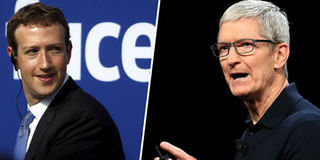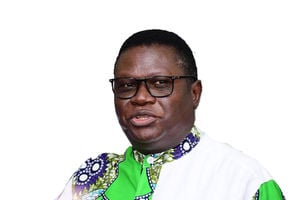Prime
Who has the power in an app dispute?

Left to right: Mark Zuckerberg, Facebook’s founder and chief executive. Apple’s CEO Tim Cook. COURTESY PHOTO
What you need to know:
While Facebook is the world’s biggest social network, Apple controls the distribution of apps — including Facebook’s — on its phones. That power is a long-standing concern for Mark Zuckerberg, Facebook’s founder and chief executive, making his company beholden to the rules of others.
When Facebook employees woke up Wednesday morning, many found they could not perform even the most basic work tasks.
Their calendars were not working. Nor were campus maps that help people find their co-workers. They were unable to check Facebook’s latest shuttle bus schedule. And they could not see what the company’s cafeterias were serving for lunch.
That’s because those features run on Facebook’s internal, custom-built iPhone apps — and Apple had shut them all down, according to nine current and former employees of the companies, who requested anonymity because they were not authorised to speak publicly.
The situation stemmed from a dispute after Facebook violated Apple’s rules by publicly distributing a research app that allowed it to snoop on users’ online activity.
When Apple discovered the transgression this week, it revoked Facebook’s special access to apps and updates that run on its iPhone software.
That immediately cut off Facebook’s 35,000 workers from its internal iPhone apps. And the problem snowballed when mobile apps like Workplace and Messenger — two internal communication tools — also stopped working, frustrating employees and resulting in hours of lost productivity.
While Facebook is the world’s biggest social network, Apple controls the distribution of apps — including Facebook’s — on its phones.
That power is a long-standing concern for Mark Zuckerberg, Facebook’s founder and chief executive, making his company beholden to the rules of others.
Tensions
The spat underscored the tensions between two of Silicon Valley’s largest tech companies, which have competed for years over talent and new technologies.
Recently, each has taken potshots at the other over data privacy, with Apple’s chief executive, Tim Cook, trading slights with Zuckerberg in interviews.
Late Thursday, Apple relented and restored Facebook’s access. Yet the episode was a stark reminder of where the power really lies in the technology world.
Facebook also worked this past year with a public-relations firm, Definers Public Affairs, to urge reporters to scrutinize Apple and other tech companies. And Apple has made changes to some of its tech features that limit the ability of Facebook and others to track users.
Apple did not immediately have a comment Thursday after reinstating Facebook’s access to its internal apps. In a statement, Facebook said it was “getting our internal apps up and running” and added, “To be clear, this didn’t have an impact on our consumer-facing services.”
Apple also briefly demonstrated its power Thursday with another Silicon Valley giant, Google. Like Facebook, Google had violated Apple’s rules by publicly distributing an app, Screenwise Meter, through a special Apple developer programme.




